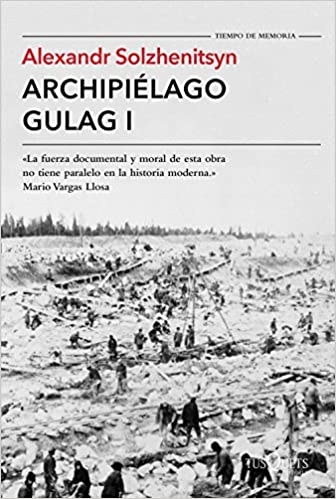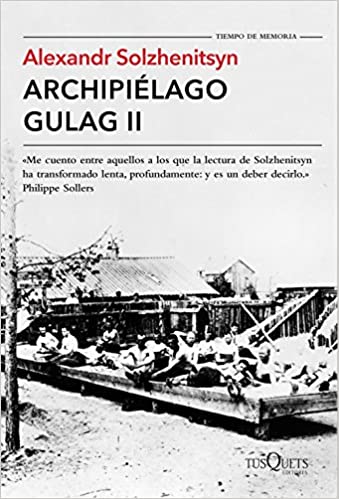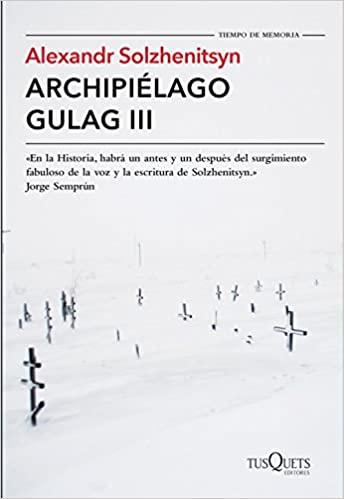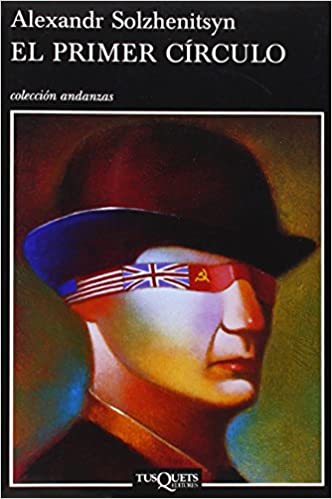Today we bring a unique writer like Alexander Solzhenitsyn who, to dare to classify him, we would have to think of a hybrid between the dystopian-political perfectionism of George Orwell; existentialism limited in the story but very intense in its projection of Chekhov; and the realism of his sad circumstances, on the other hand, never avoided based on his unavoidable ideals.
Because good old Aleksandr (better not to propose to pronounce his surname correctly), with his look to the Isaac Asimov, was always consistent with his vision of the world. The same when he went to the front to defend Russia from the Nazis, and later when they tried to silence him for explaining aspects of other cultures that did not fit with the Soviet imagination.
This is how he ended up in the gulag and this is how those who sent him there made it easier for the miseries of those detention and exploitation camps to be known throughout the world when Aleksandr put the atrocities of the Russian communist regime in black and white.
The novel, the biography, the testimony and the chronicle acquire Aleksandr that unshakable unity of the human, probably the greatest significance of his work to reach the Nobel Prize in Literature 1970.
Top 3 Recommended Books by Aleksandr Solzhenitsyn
Gulag Archipelago
Accounting for the atrocity committed by the Soviet regime for more than 30 years is enough for many volumes. From before 1930 until 1960, anyone who disagreed, was uncomfortable, or was simply singled out could go to occupy a place in one of the Gulag camps, along with criminals of all stripes. Aleksandr was there for more than ten years. But in 1958, two years after escaping alive, he devoted himself to writing what he observed and experienced in the midst of the atrocious prison system. And he didn't leave anything out.
In this monumental document, solzhenitsyn, who was confined in one of those camps, painstakingly reconstructs life inside the prison industry during the times of the Soviet Union, and his dissection becomes a journey through fear, pain, the cold, hunger and death, with which the totalitarian regime silenced all dissidence. The three volumes are referred to below. More than 2.000 pages in total to present to the world the suffering of generations and generations of Russians subjected to the most criminal authoritarianism. Perhaps never so exposed to the light and stenographers of Nazism, but just as inhuman.



A day in the life of Ivan Denisovich
In addition to addressing the issue of the Gulag from a chronological point of view, the emotional part of what that time of life in frozen hell meant, was reflected in this kind of novel sprinkled with realism, logically.
Taking advantage of the freer perspective of the novel, which allows us to delve into the very particular aspects of the protagonists of that tragedy, the author presents us with Iván Denisovih who faces his last days of sentence. Stockholm syndrome that can appear in a field of forced labor in the gulag acquires in Iván a value of very complex humanity. Because everything in the past is time lost, only lived.
And in the best of cases like Ivan's, within an age range young enough to survive..., and to think that your life has been stolen into hell. The worst of all for Ivan is the lightness of his condemnation, the mistake that associates him with a traitor, a deserter, a spy when he did precisely the opposite, escaping from the Nazis to return to his beloved Russian army.
No one better than Ivan, with the desperate feeling of a vital crossroads between what was and what remains of him, to understand the dramatic sensation of those Soviet prisons determined to destroy and undermine the consciousness of anyone who passed by there. And yes, so We only approached Ivan one day. Enough to imagine, perhaps in the most precise way, what that could be like in an almost endless sum of sunrises over a freezing sun that barely illuminated those lands.
The first circle
In this novel Aleksandr becomes John le Carré. Only in the case of the Russian writer, knowing his background as a true repudiate of the USSR, the matter takes on a different dimension. In fact, in the end we return to the universe of the gulag and its infernal system of prisons that exploited every human being who passed through there. The Gulag is that, Dante's circles of hell, led in this case by a Virgil who spews pro-Soviet insults, as if everything were for a greater good, a homeland that can dispose of any threatening life or opinion.
But at the same time this book is something else, it is an intense novel in search of a deep throat, a voice that alerts the United States about Soviet atomic projects. And atomic energy was during the cold war, together with the space race, the two great challenges, the capricious battles of one and the other, like macabre games.
The word has come from the Russian Foreign Ministry itself. Except that no one from the KGB manages to find the sender of the message, logically recorded, like so many things supervised by the Soviet leadership. The call only leads them to Special Prison 1, since the knowledge transmitted to the Americans could only be available to scientists. confined there due to their threatening nature... And if one does not reveal their identity, everyone may pay the price...



1 comment on “The 3 best books by Aleksandr Solzhenitsyn”